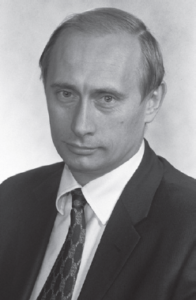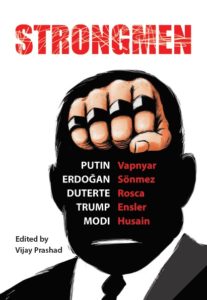
On the Manufactured "Sex Appeal" of Vladimir Putin
Lara Vapnyar Has Some Thoughts on Russia's Brutal, Bear-Wrestling "Husband"
I hate to admit it, but every time I see yet another topless photo of Putin, Right Said Fred’s song starts playing in my head.
Too sexy for my shirt
So sexy it hurts.
This doesn’t happen by accident or as a result of the dark workings of my perverse mind. This happens because I’m a victim of the Russian propaganda machine. Putin’s “sexiness” and the idea of his “sexual prowess” has been carefully cultivated as part of his overall political image.
I’m not sure whose idea it was and when exactly the great work on Putin’s sexiness started, but he hadn’t always been “too sexy for his shirt,” certainly not as a younger man.

Putin in the 1980s, 1990s, and early 2000s was the opposite of sexy. A modest KGB officer working on the sidelines who grew to be a quiet bureaucrat and evolved into a tough but self-effacing ruler, a man without qualities, an invisible man, “a man without a face,” as Masha Gessen calls him in her seminal biography.
The first and rather shocking awareness of Putin’s sexiness came to people a few years before the election of 2012, after a series of photos depicting him in the midst of bold and striking adventures appeared in the press.
There was Putin in 2009, vacationing in Siberia. Climbing trees. Having simple meals with villagers. Swimming in freezing Siberian rivers. Diving in the world’s deepest lake, Baikal. Riding horses down the rugged terrain while shirtless.
The UK’s Daily Mail noted that: “Tony Blair may prefer ritzy yachts in the Caribbean, but it’s a hardman’s life for Vladimir Putin,” leaving no doubt about which man that venerable publication preferred.
Putin’s “sexiness” and the idea of his “sexual prowess” has been carefully cultivated as part of his overall political image.
Then there was Putin in 2010 hunting a whale off the coast of Kamchatka Peninsula. Choppy waters, steel-gray sky, Putin dressed in macho red and black colors leaning over the edge of a rubber boat, aiming his dart gun with great concentration. He did manage to kill a whale (or rather, his team managed to create the impression that he had). The mission was a great success.
The Guardian reported that “when the boat skidded onto the beach, Putin hopped off and made a beeline for waiting reporters. Clearly in his element, Putin replied jovially to a question as to whether the endeavor was dangerous. ‘Living in general is dangerous,’ he quipped. Asked why he got involved, he replied, ‘Because I like it. I love the nature.’” At least he didn’t say “I am nature” like Jackson Pollock once did.
Then there was Putin entering the cage of a lively leopard, tracking a Siberian tiger, putting a collar on a huge polar bear (the animal was heavily sedated, but still). Yet nothing could quite compare with his highly publicized flying with cranes stunt. This was taking publicity to another level.
The idea was for Putin to board the motorized hang glider, get up in the air, and lead the flock of real live cranes toward their migration destination, acting like a leader of the flock or, in other words, an alpha male. All of the participating humans did their job really well. With the help of the experienced pilot, Putin did get up in the air and flew in the needed direction. The only problem was with the cranes—apparently the birds were too confused to form the proper geometric shape and follow their human leader. But then who cares about the birds? The majority of the Russian population certainly didn’t.
The Western press as well as the Russian intellectual elite pronounced the stunt a laughable failure, a desperate vanity project of an unstable aging man. But Putin has always cared very little about the Western press, and possibly even less about the Russian intellectual elite. The only thing that mattered was the opinion of the general Russian population. And the population loved it. They saw their leader soar into the sky on a heroic quest. They saw their leader as a bold and sexy alpha male. Bolder, sexier, more alpha than any other world leader. That was the idea that stayed in people’s minds. And the birds that didn’t make it were instantly and easily forgotten.
But if the cranes stunt was merely suggestive of Putin’s sexual prowess, there were other, more transparent publicity tricks. The most amazing of them was the series of videos credited to an advertising agency Aldus ADV.
In one of them, a young Russian woman asks a fortune-teller about her intended. “It’s my first time,” she confides, “I want it to be for love.” Everything in the scene, from the woman’s words to her nervousness suggests that she’s about to lose her virginity. The fortune-teller pulls a card, and guess who is on it? You’re absolutely right, Vladimir Putin! Because who else would be better at taking your virginity with love?
The population loved it. They saw their leader soar into the sky on a heroic quest. They saw their leader as a bold and sexy alpha male.
Another video of the series shows a young woman in a doctor’s office. Her concern is the same. She wants her first time to happen just right. The doctor talks to her about the importance of protection. Safety is important, especially during the first time (I’d say it’s equally important during subsequent attempts, but let’s stay on topic). And just then the camera shifts to the calendar on the wall. Now, guess who is on that calendar? You’re right again, Vladimir Putin! Because who else is responsible enough to ensure the needed level of protection during your first time? After that we follow the young woman to the polls. She looks enthusiastic, and we’re confident that she’ll make the “right” choice.
The Aldus ADV agency said to the press that it created the clips with the aim of targeting younger voters and making them excited about taking part in the elections. But I think they also targeted a much larger demographic by planting the idea of Putin as a strong and capable lover.
Soon after the election of 2012, the media was flooded with the new wave of images speaking of Putin’s sexual prowess. This time the rumors were focused on Putin’s alleged lover, former gymnastics champion Alina Kabaeva, then 30 years old. People were saying that the couple had maintained a relationship for years and even had a child together. Putin himself denied the rumor, and there is no way to know whether this was a fact or a lie, accidentally spilled dirt or a carefully leaked open secret. But regardless of the true state of events, it’s hard to think of a more perfect woman to fit the role of Putin’s public mistress. Kabaeva is not just a younger woman. She is an extraordinarily robust and proficient younger woman. One can hardly imagine her submitting to a lesser lover, or one incapable of killing a whale or handling a polar bear.
Around the same time, Putin announced that he was divorcing his wife of almost 30 years. Lyudmila Putina had always been a kind of “silent partner” in the marriage, and the divorce was as quiet and amicable as they come. In a carefully staged televised announcement, Putin said that even though both he and his wife loved their daughters dearly, and remained affectionate to each other, their marriage was simply over. And his wife said that they were spending very little time together, and that Putin was devoted to his job so fully and absolutely that there was no time or space in his life for a marriage. There was not a single note of bitterness in Lyudmila’s tone, in fact her expression throughout the announcement was of a warm enthusiasm. For those concerned, Lyudmila wasn’t beheaded or confined to a monastery like the wives of Henry VIII or Ivan the Terrible. She seems to be thriving. Or at least this is what the Russian media wants us to believe.
As for Putin, he finally became unencumbered to fulfill the role of the husband of Russia itself.
Historically, all the other Russian leaders—from the tsars to Lenin and Stalin—were seen as Russia’s stern but fair fathers or sometimes even as frail grandfathers (like Brezhnev in later years). The great change came with Gorbachev, a West-oriented, liberal figure who positioned himself as a cool uncle rather than boring father, which was met with either admiration or ridicule by the Russian population, or often with both admiration and ridicule. And then there was Yeltsin, who presided over Russia during the years following the dissolution of the Soviet Union.
Yeltsin further developed Gorbachev’s liberal reforms, but the country kept experiencing unbearable political humiliations as well as being on the verge of economic collapse. Cultural elites were enjoying previously unimaginable freedoms—literature, film, media projects all flourished, journalists weren’t afraid to speak their minds. But at the same time, the general population suffered from real poverty, just as the newly minted oligarchs kept appropriating the country’s resources and flaunting their unimaginable wealth. Ordinary Russian didn’t appreciate the freedom of speech and other tenets of democracy all that much. Most of them would have certainly preferred some stability. Yeltsin, with his flailing politics and boozy TV appearances came to be regarded as a weak alcoholic husband, the one that would flaunt his largess while drinking his wages away and draining the family’s finances, a sadly familiar figure in many Russian households. Back then, a lot of people felt that Russia didn’t have a chance to survive let alone regain power, unless it had a much stronger leader.
And just then Yeltsin unexpectedly resigned, and Putin took his place as acting president—a quiet, “faceless,” seemingly unthreatening man who quickly established himself as a savvy, determined, and unusually ruthless politician.
Historically, all the other Russian leaders—from the tsars to Lenin and Stalin—were seen as Russia’s stern but fair fathers or sometimes even as frail grandfathers.
There is an unconfirmed anecdote from Putin’s first year in power that reveals his true character as a leader. The second Chechen war was going on, and there was no end in sight. The Russian Army surrounded Groznyj, the capital of Chechnya, yet the Chechen fighters refused to give it up. The only way to seize the city was to carpet bomb it. While the majority of the population had gone, there were still plenty of civilians stuck within Groznyj’s walls, a lot of them elderly and disabled, tens of thousands or perhaps even hundreds of thousands of people. All of them Russian citizens. Top Russian military officials had an emergency meeting with Putin, still an acting president at the time, to assess the situation. One after another, seasoned generals would stand up and say that, no, the Russian Army couldn’t possibly bomb Groznyj, when so many Russian civilians would be killed. And then it was Putin’s turn to speak. He said: “We have to bomb it.” There was a deadly silence in the room, after which everybody present understood that Putin was a true ruler of Russia and he was there to stay. Russian troops seized Groznyj soon after that, while razing most of it in the process.
Putin’s ruthlessness allowed him to reestablish Russian power in all kinds of different aspects. He severely restricted the most vociferous oligarchs, imprisoning some while banishing others and appropriating their assets. He poured a lot of money into the Russian military, basically restoring its strength. He instigated some important reforms to help Russia’s economy grow (rising oil prices didn’t hurt either), which helped the Russian population emerge from poverty. But perhaps more importantly, he restored Russian national pride. In the eyes of the Russian general population, Putin “made Russia great again.” Or rather, strong and scary again. And when he smothered new freedoms and silenced the opposition, the general Russian population didn’t seem to mind.
The longer Putin stayed in power, the more Russian people came to associate him with an image of a brutal lover, or rather a brutal husband of Russia, the alpha male who would kill a whale, hunt a tiger, or soar into the sky with a flock of birds for his wife, but would not hesitate to beat some sense into her whenever needed. This image of a macho husband was in perfect sync with the movement to restore the old Russia’s values that had been destroyed after the revolution of 1917, to reestablish the power of the Russian Orthodox Church, and create conditions for the general revival of Russian patriarchal traditions. In January of 2017, domestic violence laws were changed to make the punishment for offending husbands less severe. Before, a husband who repeatedly beat his wife would be sentenced to several years in jail. Now all he will get is a fine, which will probably hurt the family more than him, making the wives reluctant to report any violence whatsoever. It looks like it is only a matter of time before Domostroy, the infamous 16th-century set of domestic rules, will be resurrected, along with the required tyrannical domination by a husband.
In the eyes of the Russian general population, Putin “made Russia great again.” Or rather, strong and scary again.
There is an old saying that is still uncomfortably popular in Russia: “He doesn’t love you if he doesn’t beat you.” Which means that the only reason the husband wouldn’t beat his wife is that he doesn’t care about her. And it’s obvious that beatings are done for the wife’s own good. The saying suggests that the beatings are not just acceptable, but desirable, a symbol of marital attention and love. And this is precisely the type of husband that Russia got in the person of Putin. He does horrible things that often badly hurt Russian citizens, but the Russian population is okay with that. He is tough but sexy, he is full of care and love. Because, you know, he doesn’t love you if he doesn’t beat you. Here is how this logic works. The West applies sanctions against Russia. Putin’s response is to apply his own sanctions that say “fuck you” to the West but actually hurt Russian citizens. The ban on foreign adoptions of Russian orphans is just one example. The ban on Western food import that is about to be followed by the ban on Western medications is another. The West is humiliated, the Russian pride is preserved. And so what if the Russian people would not have access to their medications and Russian orphans would have to rot in the badly managed state institutions?
He doesn’t love you if he doesn’t beat you.
The Russian opposition expresses discontent. Putin’s government response is to violently suppress peaceful demonstrations and throw people into prisons, some of them seemingly at random. It’s okay. He doesn’t love you if he doesn’t beat you.
Terrorists seize buildings, like the Moscow theater in 2002 or Beslan elementary school in 2004, and take hostages. Putin refuses to negotiate. He orders the attacks by the Russian armed forces, killing more than half of the hostages in the process (including small children). 204 hostages died in Moscow. 334 died in Beslan, 186 of them children.
The deaths don’t really matter, because Putin has shown to the world that the Russians are too tough to negotiate with terrorists. He doesn’t love you unless he beats you.
In 2014, Putin annexed Crimea, which started an unofficial war with Ukraine, Russia’s closest and historically most trusted neighbor. Many more Russian lives were lost. But the general population rejoiced—Putin managed to flip the West and regain some of the formerly Russian territories. It’s uplifting, it’s invigorating, it’s sexy to have a leader who is making your country “great again.”
So sexy it hurts. Really hurts badly.
__________________________________

From Strongmen. Courtesy of OR Books. Copyright © 2018 by Lara Vapnyar.
Lara Vapnyar
Lara Vapnyar emigrated from Russia to New York in 1994 and began publishing short stories in English in 2002. She lives on Staten Island and is pursuing a Ph.D. in comparative literature at CUNY Graduate Center. Her new novel is Still Here.












